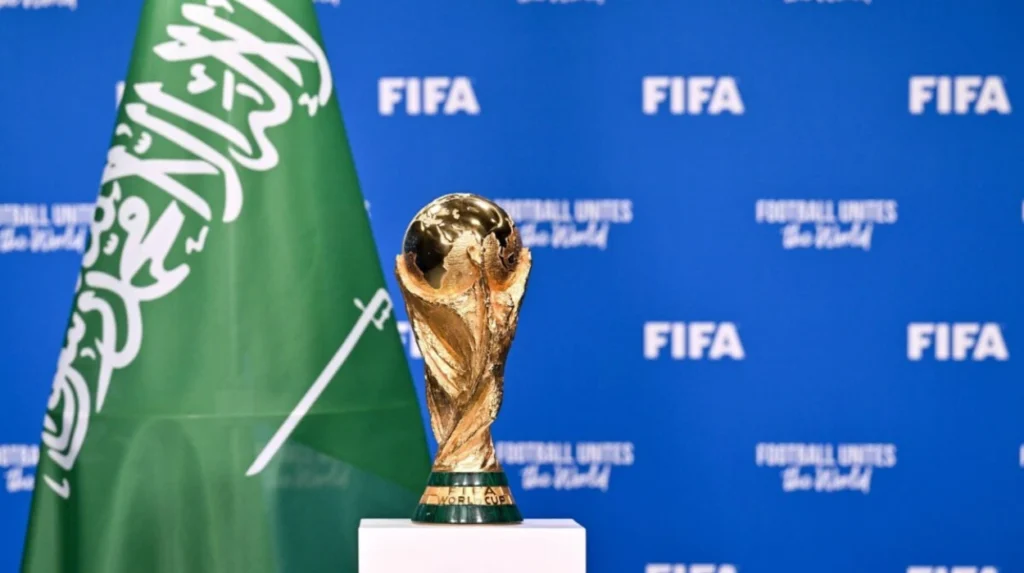Saudi Arabia’s dreams to stage the 2034 FIFA World Cup come into conflict brutally with its financial realities today. Recent documents released from the Financial Times indicate that the kingdom’s Public Investment Fund (PIF) has taken a $8 billion write-down of its value of megaprojects, including the $500 billion Neom city. The PIF, the core of Crown Prince Mohammed bin Salman’s Vision 2030 economic vision, now places its onshore megaprojects at $56 billion, or 12.4 percent less than in 2023. The writedowns are blamed on budget overshoot, operational issues, and choppy worldwide economic conditions, including declining oil prices.
For FIFA, hosting a World Cup means a financially stable host country that can deliver massive infrastructure projects and is dependable in fulfilling obligations. Saudi Arabia’s recent financial instability puts all this into doubt.
The Neom Project: A Symbol of Mismanagement
Neom, a planned futuristic city constructed from ground up along the Red Sea, is the quintessential example of Saudi Arabia’s overreach projects. Even with its astronomical $500 billion price tag, Neom has suffered from repeated delay and downscaling. Sections of the project are being suspended or phased out because of logistical complexities, far-flung location, and operational wastages.
If Saudi Arabia cannot even implement projects of this scale within its own borders, then it raises significant concerns regarding whether it can manage the intricacies of hosting a global sporting competition such as the World Cup. From building stadiums to housing fans and getting them there, the record of the kingdom indicates high risk of failure.
Overreliance on Oil Revenue
Though Saudi Arabia has sought to diversify its economy as part of Vision 2030, oil exports remain responsible for earning over 60 percent of the nation’s revenue. The PIF’s recent reports indicate gains predominantly fueled by rising holdings in the state oil firm Aramco. Nevertheless, shares of Aramco decreased by 14.3 percent in 2024, and dividends were reduced because of low oil prices.
Such reliance on an unpredictable resource makes the World Cup vulnerable to financial threat. Any market instability or decline in oil revenue might threaten funding, infrastructure, and operational assurances required for a FIFA-sized tournament.
Governance Issues and Transparency Deficit
Saudi Arabia’s PIF has become more inclined to centralize its investments at home, away from global projects. Although the fund has seen returns that are positive, it has also experienced impairments, falling net profits, and operating uncertainties.
Organizing the World Cup requires transparency, accountability, and international cooperation. However, Saudi Arabia’s governance is extremely centralized in the hands of Crown Prince Mohammed bin Salman with no strong oversight. Financial secrecy and centralist decision-making raise the stakes for mismanagement and corruption, rendering the kingdom an untrustworthy host.
Human Rights Issues Cannot Be Ignored
Financial and operational issues are only half of the issue. According to a recent report published in 2025 Saudi Arabia’s human rights record raises legitimate ethical concerns. The kingdom is infamous for stifling political opposition, limiting free speech, and perpetuating institutionalized gender inequality.
Granting the World Cup to a regime with such a record would be a quintessential instance of sportswashing, leveraging the international event to promote an artificial image of modernity and openness and obscure continuing abuses. FIFA, the governing association of football, has a responsibility to uphold standards of fairness, inclusivity, and respect—standards Saudi Arabia has consistently refused to meet.
Lessons From Past Failures
The PIF’s latest $8 billion writedown and Neom’s challenges are symptoms of systemic problems rather than one-off events. Constant scale-backs and delays both demonstrate bad planning and over-ambition.
FIFA cannot risk making errors of previous tournaments that have been organized by nations that have issues with financial mismanagement or political instability. The World Cup needs perfect execution and international trust, which Saudi Arabia does not possess at the moment.
Ethical Responsibility of FIFA
The awarding of the World Cup cannot only be thought of in terms of infrastructure and financial capacity but also human rights and standards of governance. FIFA’s own laws stress that social responsibility, respect, and openness should be promoted. Saudi Arabia hosting the tournament would undermine these very principles.
By selecting a host with reported financial volatility, governance problems, and repeated human rights abuses, FIFA stands to jeopardize the integrity and reputation of the World Cup. Moral imperatives must be prioritized over economic gain or political pressure.
Risks to Global Stakeholders
Millions of enthusiasts, sportsmen, sponsors, and media rely on the safe conduct of the World Cup. A financially troubled host increases the threat of construction delays, inadequate accommodations, and logistical breakdowns that might influence millions of individuals across the globe.
Other than that, international media partners and corporate sponsors expect openness and professionalism. Putting the World Cup in a nation with repeated economic failures and unopen governance subjects all involved parties to unnecessary threats.
Saudi Arabia’s Track Record Indicates Repeated Overreach
Crown Prince Mohammed bin Salman’s Vision 2030 has placed ambitious projects front and center, but the track record indicates repeated overreach. Neom, a science fiction-inspired city, is largely incomplete, and other projects are subject to scale-backs because of unexpected costs.
The kingdom’s bid to modernize through lavish infrastructure has turned out to be risky and uneven. If Saudi Arabia is not able to complete these domestic initiatives, it is far-fetched to anticipate perfect delivery of an international sporting event that calls for coordination on a larger scale.
A World Cup That Upholds Values
Granting the 2034 FIFA World Cup to Saudi Arabia would be on several fronts a misstep. Financial uncertainty, ambitious and late-running schemes, dependence on fluctuating oil earnings, centralized rule, and human rights violations in total render the kingdom unsuitable to host the world’s most important football competition.
The choice is clear: Saudi Arabia must be prevented from hosting the 2034 FIFA World Cup. It is imperative that a responsible, capable, and open host country be chosen in order to keep the World Cup a celebration of sport, inclusivity, and human values—and not a forum for covering up financial malpractice and systemic repression.

